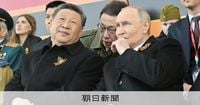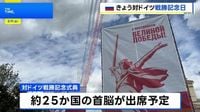On May 9, 2025, Moscow hosted a significant military parade commemorating the 80th anniversary of victory over Germany in World War II. The event unfolded at Red Square, where Russian President Vladimir Putin delivered a speech that aimed to reinforce Russia's narrative regarding its ongoing conflict with Ukraine.
During his address, Putin stated, "We must not forget the lessons of World War II, and we will not accept attempts to distort its origins and harm the true victors." This remark reflects the Kremlin's ongoing efforts to frame its military actions in Ukraine as a continuation of the fight against fascism, positioning Russia as a bulwark against Nazism, anti-Russian sentiment, and anti-Semitism.
Putin's speech came amid a declared 72-hour ceasefire, which has been largely disregarded, as both Ukrainian and Russian forces continued to engage in hostilities. The atmosphere surrounding the parade was notably tense, with heightened security measures in place, including the blocking of outdoor internet access in Moscow. Citizens reported difficulties accessing social media platforms, highlighting the government's control over information during such pivotal events.
Attending the ceremony alongside Putin was Chinese President Xi Jinping, signaling a strengthening of ties between Russia and China amid ongoing geopolitical tensions. The presence of leaders from approximately 25 countries underscored the significance of the event on the international stage.
Putin emphasized the need for national unity, calling on citizens to unite both militarily and peacefully to achieve strategic goals. His tone, while still assertive, was less confrontational than in previous speeches, notably those made last year which emphasized Russia's nuclear readiness. This shift may indicate a strategic recalibration as peace talks continue between Russia and the West.
In addition to the military display, the parade served as a platform for Putin to reiterate Russia's narrative regarding its historical role in World War II. He remarked, "Russia has been and will continue to be an insurmountable wall against Nazism, anti-Russianism, and anti-Semitism," a statement that resonates deeply within the context of Russian history and its interpretation of the war.
As the parade progressed, military units showcased their capabilities, with an array of armored vehicles and personnel marching through the square. This display was not just a celebration of past victories but also a demonstration of Russia's military strength in the current geopolitical climate.
The ceremony was closely monitored by security forces, reflecting the government's apprehension about potential disruptions. The heightened security measures included not only internet blackouts but also a significant police presence, ensuring that the event proceeded without incident.
As the world watches, the implications of this parade extend beyond mere celebration. It serves as a reminder of the ongoing conflict in Ukraine and the complex narratives that are being constructed by both sides. The Russian government continues to portray its actions as defensive, while Ukraine and its allies view them as aggressive incursions into sovereign territory.
In the lead-up to the parade, various reports indicated that while the Kremlin seeks to project an image of strength and unity, the realities on the ground tell a different story. The continued fighting and the humanitarian crisis in Ukraine remain pressing issues that overshadow the celebrations.
As the ceremony concluded, many observers noted the juxtaposition of a grand military display against the backdrop of a protracted conflict. The Russian leadership's commitment to framing its actions in a historical context suggests that the narrative surrounding the war will continue to evolve as both sides seek to assert their perspectives.
The Victory Day parade, therefore, is not only a commemoration of past sacrifices but also a strategic maneuver in the ongoing narrative of the conflict in Ukraine. It highlights the complexities of modern warfare, where historical memory and contemporary politics intersect in profound ways.
With tensions still high and the future uncertain, the world remains vigilant, watching how Russia's actions will unfold in the coming weeks and months. The military parade may have concluded, but the discussions it has sparked regarding history, memory, and national identity are far from over.


![[深層NEWS]ロシアの対独戦勝記念日の軍事パレード「勝利は近いという印象を与えたかったのでは」…石川一洋氏(読売新聞オンライン) - Yahoo!ニュース](https://thumbor.evrimagaci.org/hTqhkiNpZc6PfgbrRmtjKmmMels=/200x0/tpg%2Fsources%2F8b8a534d-322f-4d3f-ac1a-6175dfc68dd2.jpeg)



